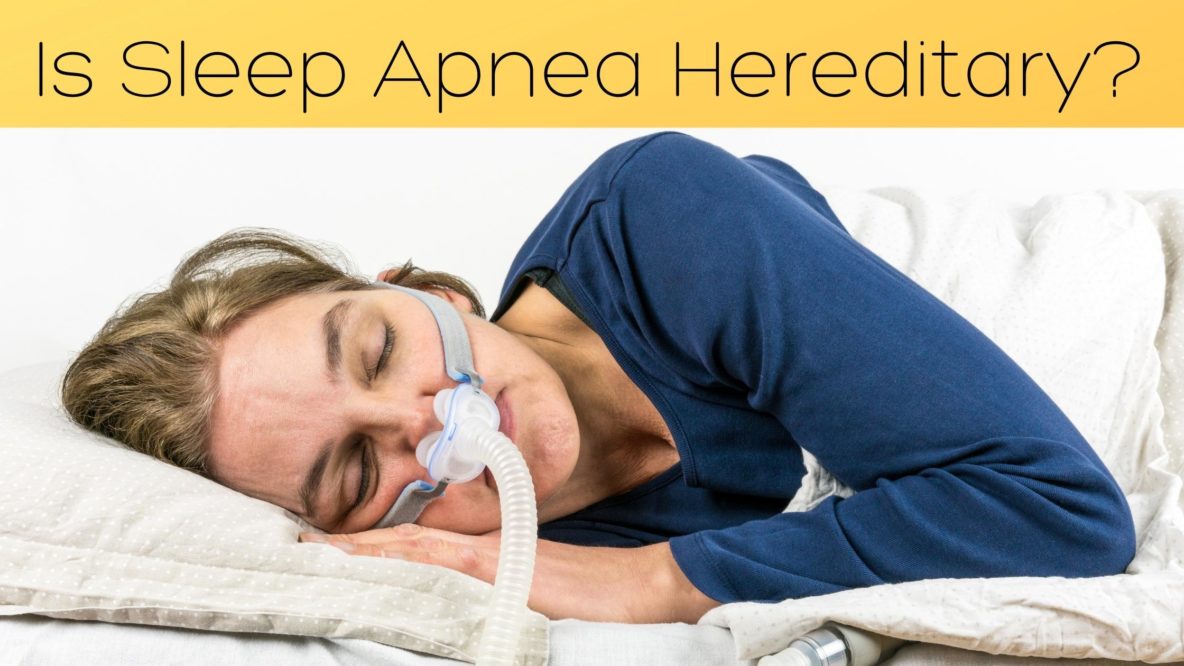Is Sleep Apnea Hereditary?

- A Promising Paradigm Shift: New Research Challenges the CPAP-First Approach to OSA Treatment - September 5, 2023
- Understanding Sleep Meditation Techniques - July 30, 2021
- How Online Learning Has Affected Sleep for Students - July 13, 2021
Do you snore loudly in the night, or wake up gasping for air? You might have sleep apnea. This happens when the muscles in your throat and neck relax in sleep, and become so relaxed they block your airway. To restart the flow of oxygen, you wake up repeatedly throughout the night to tighten these muscles. This happens in less than a second, so in the morning you may not remember waking up during the night.
Sleep apnea causes disrupted sleep, poor REM sleep, daytime fatigue, and more. Here are the main risk factors for sleep apnea, including your overall health, your lifestyle, and genetics.
Hereditary Factors and Sleep Apnea
Researchers estimate that approximately 40% of Obstructive Sleep Apnea cases have a genetic component. This means that for some people, sleep apnea can be hereditary. If you have close relatives with sleep apnea, you are more likely to develop sleep apnea as well.
The genetic component to sleep apnea can make you more likely to develop sleep apnea even if you’re very healthy. You may also inherit other traits, such as having a larger neck, or having a small or recessed jaw that can increase your risk of sleep apnea. Other factors you may have learned from your family, such as physical activity levels or eating habits, can also increase your risk of sleep apnea.
Other Factors that Contribute to Sleep Apnea
Sometimes, hereditary factors overlap with other factors such as overall health and lifestyle. There are several other factors that can increase your risk of sleep apnea. These include:
- Heart conditions: Heart failure or a stroke can increase your risk of sleep apnea
- Age: As you get older, your risk of sleep apnea increases
- Gender: Men are more likely to develop sleep apnea than women
- Weight: Being overweight significantly increases your risk of sleep apnea
- Hypertension: If you have high blood pressure, you have a higher risk of sleep apnea
- Alcohol consumption: drinking alcohol, especially in the evening, can cause all your muscles to relax. This includes the muscles in your throat that may block your airway at night.
The Signs of Sleep Apnea
If you’re concerned you may have sleep apnea, watch for these signs. You can also ask your family members to help you spot these signs of sleep apnea.
- Loud snoring at night
- Periods in the night when you stop breathing
- Waking up gasping for air in the night
- Waking up in the morning with a dry mouth
- Having frequent morning headaches
- Experiencing daytime fatigue
- Feeling irritable and short-tempered
- Struggling to concentrate on tasks
The main signs of sleep apnea include snoring loudly at night or having moments when your loud snores are suddenly interrupted, and you stop breathing. You won’t be aware of these signs, so your partner may be the one to notice the signs of sleep apnea.
Should You Visit a Sleep Specialist?
If you’re experiencing poor sleep most nights, and this has been an ongoing concern for several weeks or months, it’s time to visit a sleep specialist. If your partner has been complaining about your snores, or they’re worried that you don’t breathe evenly during the night, take it seriously. This could be a sign that you have sleep apnea.
Whether your sleep apnea is hereditary or caused by lifestyle or health factors, visit Sound Sleep Medical. We’ll perform a sleep test to get to the bottom of your sleep concerns. This can include asking detailed questions about your symptoms, talking to your partner to hear more about your symptoms, and monitoring your sleep overnight to track your heart rate, oxygen levels during sleep, breathing, and snoring.
Sound Sleep Medical
Just because your sleep apnea may be hereditary doesn’t mean you have to live with it. Treatment options are effective for sleep apnea whether it’s caused by your health or your genes. At Sound Sleep Medical, we’ll help you find ways to improve your overall health, and make lifestyle changes that will help you get better sleep. We’ll also offer treatment options, like using a continuous positive airway pressure (CPAP) machine to keep your airway open at night.
If you have sleep apnea, we’ll help you find the appropriate treatment method to help you get the sleep you need.
